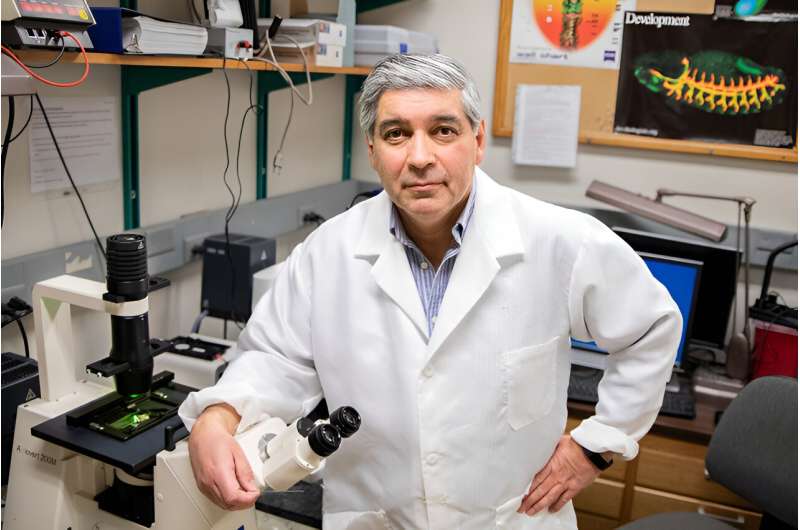This article has been reviewed according to Science X's editorial process and policies. Editors have highlighted the following attributes while ensuring the content's credibility:
fact-checked
trusted source
proofread
Researchers test previously approved FDA drugs to treat Lowe syndrome

Purdue University researchers have developed a patented therapeutic strategy for Lowe syndrome, an incurable and rare genetic disorder, by repurposing two drugs previously approved by the U.S. Food and Drug Administration for other conditions.
R. Claudio Aguilar created the treatment method, which has the potential to reverse the symptoms of Lowe syndrome and offer patients a higher quality of life. Aguilar is a professor of biological sciences in Purdue's College of Science, a Showalter Faculty Scholar, and a faculty member of the Purdue Institute for Cancer Research and the Purdue Institute for Drug Discovery.
Lowe syndrome and current treatments
Lowe syndrome is an uncommon genetic disease that affects approximately 1 in 500,000 people in the general population, yielding tens of thousands of children affected worldwide. Its characteristic symptoms are a combination of anomalies that affect the eyes, kidneys and nervous system. The life span of a person affected by Lowe syndrome rarely extends beyond 40 years, with death often caused by kidney failure.
Aguilar said treatments mostly address only the symptoms of Lowe syndrome rather than its causes.
"Therefore, they are applied only after the problems arise," Aguilar said. "We hope to mitigate the consequences of their biochemical imbalance but more importantly to prevent the abnormalities from presenting or worsening."
Rapamycin and statins
Previous investigations in the Aguilar laboratory pointed to specific biochemical pathways that affect Lowe syndrome. The discovery led Aguilar to consider two FDA-approved drugs that modulate those pathways: rapamycin and a group of drugs called statins.
Rapamycin is approved as an anti-tumor drug. It prevents organ rejection after a kidney transplant because it decreases immune response. The investigator said it is in clinical trials for the treatment of polycystic kidney disease and has shown promise against Bardet-Biedl syndrome.
"Because we found levels of rapamycin's target to be elevated in Lowe syndrome patients' cells, it was an obvious choice for a therapeutic candidate," Aguilar said. "Our results showed that Lowe syndrome patients' cells exhibited a statistically significant reversion of phenotypes and a decrease in the abnormally high levels of the rapamycin's activated target in comparison to the nontreated group."
Statins are a group of drugs that decrease the production of cholesterol in patients' cells.
"Statins interfere with a biochemical pathway that also impacts the activation of an intracellular regulator that we found hyperactivated in Lowe syndrome," Aguilar said. "The prediction was that statins would counteract the Lowe syndrome alteration and ameliorate cellular phenotypes, which we demonstrated to be the case."
During tests that administered rapamycin and statins at the same dose as their original, FDA-approved uses, Aguilar and his team observed the suppression of cellular phenotypes of Lowe syndrome and that patient cells started to behave as normal cells. He said statins and rapamycin complemented each other.
"For some patients, the administration of both drugs would be needed," Aguilar said. "Nevertheless, further investigation is necessary to assess the mode and regime of application of these compounds to ameliorate Lowe syndrome manifestations in patients."
Additional treatments and development
Along with repurposing the FDA-approved drugs, Aguilar and his team are working on agents to target and reactivate an enzyme, called OCRL1, that is functionally deficient in people affected by Lowe syndrome.
"This deficiency is the ultimate cause of the disease," Aguilar said. "We found that about 50% of mutations affect the Lowe syndrome protein structure while not affecting the region involved in enzymatic activity. Therefore, I hypothesized that it is possible to identify or design drugs to favor protein refolding to revert the structural abnormality."
A series of screens performed by the lab identified several such compounds.
"We are very excited about this new venue, as these agents would have the unique ability to activate the patient's own OCRL1," Aguilar said.


















